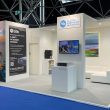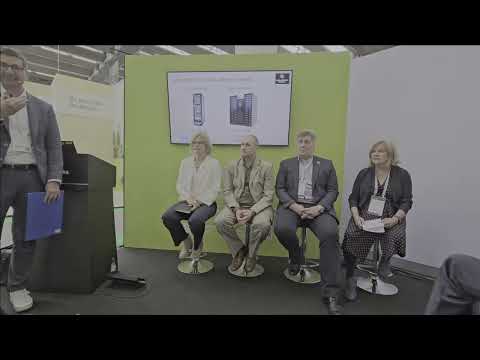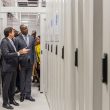At Data Centre World Frankfurt 2024 last week, a panel discussion on ‘Combined Heat Compute: Challenges & Opportunities Through AI’ explored the evolving landscape of data centers, emphasizing the shift towards liquid-cooled AI data centers. Stefan Frenzel, an independent consultant, moderated the discussion, which featured Isabelle Kemlin from RISE Research Institutes of Sweden, David Gyulnazaryan from Impleon, Professor Deborah Andrews from London South Bank University, and Henrik Borling from Huawei.
The panel began by highlighting the increasing development of liquid-cooled data centers in the US, driven by the high heat generation of AI chips, which necessitates effective cooling solutions such as direct-to-chip or immersion cooling. These solutions offer better cost-performance, reduce energy consumption, and facilitate heat reuse, leading to more efficient data center operations.
Isabelle Kemlin emphasized the critical role of research and innovation in optimizing cooling technologies. She noted that RISE’s facility in Sweden focuses on applied research, including advanced cooling techniques, to enhance data center performance. Kemlin stressed the importance of holistic cooling, which integrates server fan controls with cooling systems to optimize energy efficiency
David Gyulnazaryan discussed the significant benefits of heat reuse in data centers. He highlighted successful projects in the Nordics, where excess heat from data centers is used to provide sustainable heating solutions. Gyulnazaryan pointed out that new AI servers with liquid cooling can achieve higher temperatures, making heat reuse more feasible and environmentally friendly. He also emphasized the importance of educating both the data center industry and city governments to foster collaboration and innovation in heat reuse.
Professor Deborah Andrews underscored the necessity of adopting circular economy principles in data center design. She advocated for designing servers that facilitate easy disassembly, repair, and recycling, thereby extending their lifespan and reducing environmental impact. Andrews stressed the need for systemic thinking and proactive measures to address the challenges posed by the rapid growth of the data center industry.
Henrik Borling shared insights into Huawei’s sustainability initiatives, highlighting the company’s commitment to decarbonizing the data center industry. He mentioned Huawei’s participation in the Global Compact and the development of AI solutions to tackle environmental challenges. Borling also discussed Denmark’s innovative approach to integrating data centers into the energy ecosystem, where excess energy from wind and solar farms is used to power data centers and produce green hydrogen.
The discussion touched on the challenges of transitioning to liquid-cooled data centers and the need for supportive legislation. The panelists acknowledged the European Union’s Energy Efficiency Directive and the role of national regulations in driving energy efficiency and heat reuse in data centers.
In conclusion, the panel emphasized the importance of collaboration, innovation, and systemic thinking to overcome the challenges and seize the opportunities presented by liquid-cooled AI data centers. By integrating advanced cooling technologies, adopting circular economy principles, and leveraging heat reuse, the data center industry can achieve significant environmental and economic benefits. The discussion highlighted the potential for data centers to become key players in the transition to a sustainable and resilient digital infrastructure.









